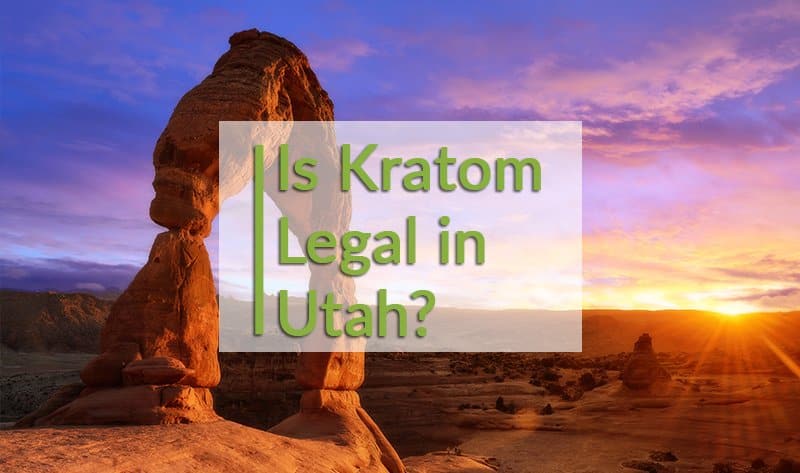
Kratom Alkaloids: The Secret Behind Kratom’s Superpower
October 16, 2020
What Is Kratom: Strains, Legal Status, Interesting Facts
December 11, 2020Utah is the 11th largest state in the United States. It’s home to several national parks and the Great Salt Lake, the largest saltwater lake you can find in the Western Hemisphere. In 2002, Salt Lake City hosted the XIX Winter Olympics.
Utah was also the place of the first department store in the US. It opened in the early 19th century and is still operational.
When it comes to kratom legality, Utah pioneered in something as well. Let’s take a look at what it is in greater detail.
Is Kratom Legal in Utah?
Kratom is legal in Utah. In the past, several attempts to ban kratom didn’t succeed. On March 26th, 2019, Utah passed the Kratom Consumer Protection Act, making it the first US state to regulate kratom.
In March 2017, a bill proposing amending the controlled substances act passed. Initially, it had kratom listed among the substances to be included in the existing list. Yet, the authorities withdrew kratom from the bill before passing it out of committee.
As a result, the authorities decided to keep kratom legal.
Kratom, however, remained unregulated. Bad players can use it as an opportunity to sell kratom that contains contaminants, adulterants, controlled drugs, heavy metals, bacteria, and other harmful ingredients.
A year later, this is exactly what happened. There was a salmonella outbreak related to kratom. This happened due to contaminated kratom from Indonesia, the largest kratom supplier in the world.
Two people in Utah became sick. One had purchased kratom in a local store, whereas the other person got sick after buying kratom online.
If kratom was regulated and properly tested, none of these cases would have occurred.
Kratom and the American Kratom Association
Kratom or Mitragyna speciosa is a tree that grows abundantly in Southeast Asian countries like Thailand and Indonesia. The powder from kratom leaves possesses alkaloids with beneficial properties.
Kratom powder is raw, and the Food and Drug Administration (FDA) does not regulate it. This means that kratom shoppers need to be careful when buying kratom. They can use reviews and forums to check for advice and red flags, but it shouldn’t be this way.
The American Kratom Association, also known as the AKA, is a non-profit activist group. It works to ensure that kratom stays legal across the United States.
In addition to that, the AKA also wants to help the kratom customer base by making sure that there are regulations on kratom products.
To accomplish that, the AKA has developed two initiatives:
- KCPA or the Kratom Consumer Protection Act, and
- GMP or the Good Manufacturing Practices program.
Both have the same purpose – ensuring that customers only get access to pure kratom. However, they accomplish that in different ways.
The GMP program is voluntary. Under it, merchants comply with specific regulations, pay a yearly fee, and agree to undergo inspections from the AKA.
On the other hand, the Kratom Consumer Protection Act is legislation that establishes kratom laws. It makes regulating kratom mandatory rather than voluntary.
The AKA lobbies the legislation in individual states.
The First US State to Regulate Kratom
In 2019, a Utah lawmaker prepared a KCPA bill. The aim of this bill was to ensure that only kratom its purest form would remain legal. Adulterated, contaminated, or otherwise unfit for sale kratom would be illegal.
The main activists behind this bill state that kratom in itself is helping many people. It’s when kratom is mixed with other substances that make it dangerous. Not kratom in itself.
The sponsor of the bill also used the 2018 salmonella outbreak as an example of the risks of selling unregulated kratom.
On March 26th, 2019, the Utah Senate passed the Kratom Consumer Protection Act, making Utah the first state to regulate kratom.
Under this bill, kratom vendors that are based in Utah must comply with the following:
- Adequately lab-test their products for purity and alkaloid content,
- Label their kratom products and disclose product origin, ingredients, and alkaloid content,
- Prohibit the sales of kratom products that contain contaminants, adulterants, illegal drugs, or other pathogens,
- Destroy any impure products,
- Not sell kratom to individuals under 21,
- Face fines or jail time if they don’t comply with the regulations.
In March 2020, Utah passed another kratom bill, establishing a new kratom law. It requires kratom sellers in Utah to pay a $200-fee to register their products as well as a $40 processing fee. The latter is supposed to cover the expenses necessary to issue a license that allows selling kratom.
This bill can even further limit the number of potential bad players in the Utah kratom market. As a result, it could leave in business only those who are serious about selling the herb.
Where to Buy Kratom in Utah?
Since kratom is legal in Utah, a number of smoke and vape shops in some of the largest cities sell it. The bill to regulate kratom passed successfully. So, the shops in Utah are some of the safest places in the US where one could buy kratom powder and capsules locally.
Nonetheless, we recommend Utahns to buy kratom online and choose vendors who sell high-quality, pure, unadulterated, and lab-tested kratom. That will offer you better prices, deals, and saving options among many other benefits.
For more information on kratom legality across the United States as well as a kratom legality map with the latest updates, view this article.








